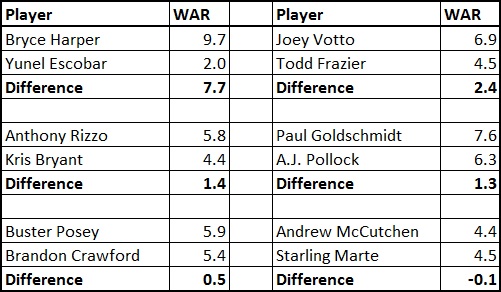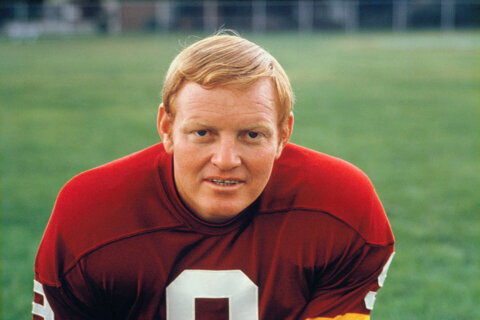WASHINGTON — It feels silly to even have to write this.
There are compelling awards races this year, notably for the Cy Young in both the American and National leagues. There are multiple worthy contenders for both Rookie of the Year Awards as well, although the Cubs’ Kris Bryant seems to be pulling away from the pack in the NL. But of all the major awards, none is as clear cut as the National League MVP Award — it’s Bryce Harper, and it isn’t close.
And yet, people are making arguments for Andrew McCutchen and Anthony Rizzo, both having great seasons, but both clearly inferior to Harper’s. Some are also making the case for New York Mets trade acquisition Yoenis Cespedes, which is patently ridiculous.
To understand why Harper is the obvious choice, let’s compare his season to the other competitors listed above, as well as to history.
The case for Harper
Coming into Thursday night’s game, Harper is batting a league-best .338, reaching base at a league-best .467 clip and slugging a league-best .670. He has hit a league-high 40 home runs and scored a league-high 109 runs. He has been, objectively, the most productive offensive player in the National League this season, all while rating as a +10 defensive runs saved in the outfield, per FanGraphs.
But Harper’s season becomes even more impressive when one looks at it in historical context. As offense has decreased across the league, Harper has come into his own this season, posting just the 14th 40+ home run season in the past five years. He still has a chance at Alfonso Soriano’s franchise single season record of 46. And if you look at his park and era adjusted numbers, he’s having the 14th greatest season since integration in 1947.
Harper has posted an OPS+ of 204 to date. That sandwiches him between Ted Williams’ 1947 campaign and Barry Bonds’ 1992 NL MVP season. In fact, the only names above him on that all-time list are Bonds, Williams, Mickey Mantle, Mark McGwire, Jeff Bagwell and Frank Thomas.
“Most”
Everyone wants to talk about the “V” in MVP, the ever-ambiguous determination of value as something other than simply objective performance. If a player homers in a game his team wins by one run, is it less valuable than a walk-off home run? What if he homers in a game his team loses?
This is literally what WAR is good for. While it’s not a perfect stat, WAR (wins above replacement, for the uninitiated) seeks to measure how many more wins a team benefits from by having a specific player in place of his likely Triple-A replacement. Bryce Harper has been worth an astonishing 9.7 WAR per Baseball Reference, 9.2 per FanGraphs. No other position player in the National League has been worth more than 7.6 (Paul Goldschmidt). Cespedes has 6.5 bWAR over two teams, 2.4 of that with the Mets.
That’s why the word “most” is just as important. Harper has provided the most value for his team. He’s even provided the most since the trade deadline. Since Aug. 1, the day that Cespedes started playing for the Mets, his slash line is .295/.345/.661. Harper’s over the same stretch is .356/.487/.651. Harper has a far superior batting average and OPS (1.137 to Cespedes’ 1.006) during that time. Now is a good time to close that debate, which never should have been opened.
Cespedes will go down as one of the great trade deadline acquisitions in recent history, though arguably not even as good as Manny Ramirez in 2008, who finished fourth in the NL MVP race that season. Any higher than that for Cespedes would be blasphemous.
The others
Below is a list of other potential candidates. They are listed along with the next-highest WAR position player on their team, and the difference between those amounts is noted.

Why? Because each one of these candidates has had great support in their efforts this season. Harper has had very little. Each of these other players has benefitted from a 4+ WAR teammate, while Harper’s been on an island, crushing strikes for home runs and taking 112 walks when he hasn’t, the second-highest total in all of baseball.
The disparity in numbers explains why Harper’s team, despite his performance, isn’t likely to make the postseason. But his success despite a lack of support should strengthen, not weaken his case against his peers.
The pitchers
The only valid argument for anyone other than Harper is, potentially, selecting a pitcher. For those who believe that a pitcher should not be eligible to win the MVP as they only play in 32-33 games during a full season, consider the following: Clayton Kershaw, a pitcher who won last year’s award, faced 798 opposing batters in 2014. That means he impacted more plate appearances than any single batter in the history of baseball in a single season (Jimmy Rollins own that record, with 778 PA in 2007). A pitcher can be deserving of the award; the question is whether one is this year.
Based on WAR, Zack Greinke is the only one close (8.4/5.6) while Jake Arrieta (7.5/6.2) and Kershaw (6.6/7.4) have both put together spectacular campaigns as well. But those three are embroiled in what should be a very close battle for the National League Cy Young, with no pitcher clearly establishing himself above the others. Greinke has the best ERA and WHIP, Arrieta has the most wins (yes, people still use that as a factor in voting) and has pitched best of late, and Kershaw has the most strikeouts and innings pitched.
All three have been excellent, and will no doubt earn some top five, or even top three votes. But the fact that none are historically dominant in the way that Harper has been should remove them from the conversation for the top spot.
Conclusion
To hold the injuries and failures of his teammates against Harper is to only further deny that he has actually lived up to the unprecedented hype and more this season. The MLB Draft has existed for 51 years. Of those 45 players who went first overall before Harper, less than half (21) ever made an All-Star Game. Only Jeff Burroughs (1974), Ken Griffey, Jr. (1997), Chipper Jones (1999), Alex Rodriguez (3 times), Joe Mauer (2009), Josh Hamilton (2010), and David Price (2012) have won an MVP or Cy Young Award. None were as young when they won as Harper is now, and none accomplished the feat in fewer than five years after being drafted.
And none have deserved it more than Harper does this season.







